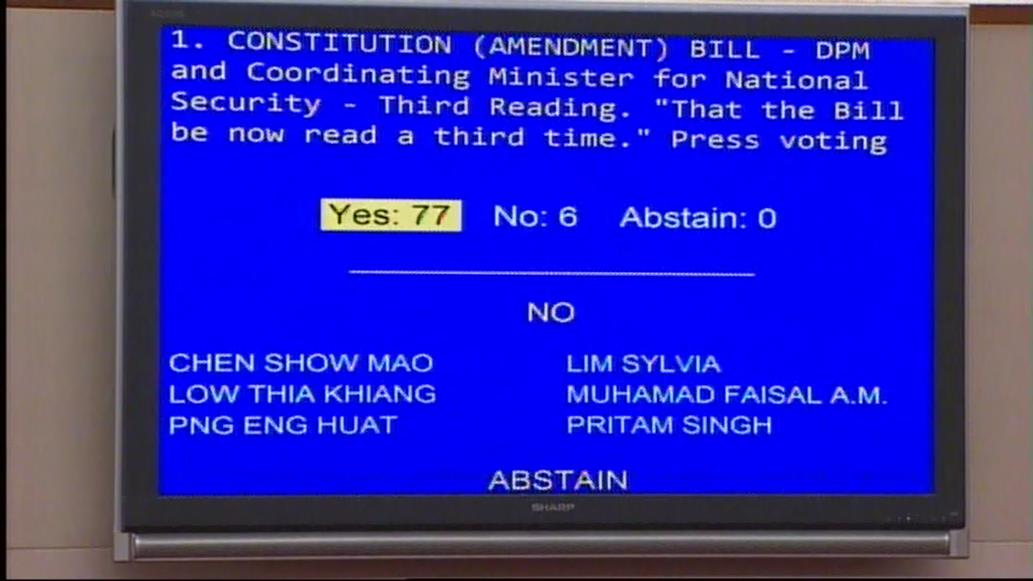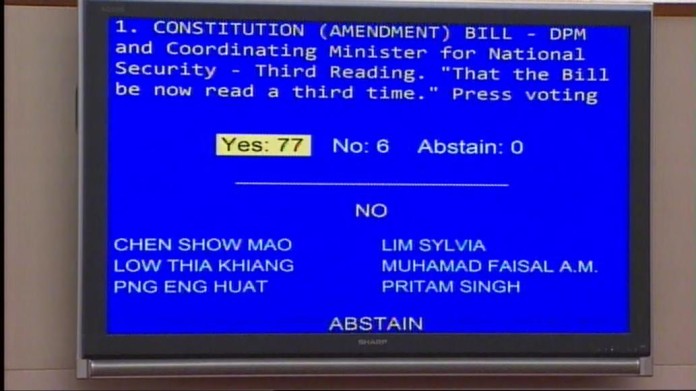SINGAPORE: Changes to the Elected Presidency have been set in motion after a Bill to amend the Constitution was passed in Parliament on Wednesday (Nov 9), with 77 Members of Parliament (MPs) giving their approval.
All six MPs from the opposition Workers’ Party (WP) voted “no”.

Bill to amend Singapore’s Constitution for changes to Elected Presidency passed in Parliament.
Under the constitutional changes, an election will be reserved for a particular racial group if no one from that group has been president for five continuous terms. The Government will start counting from the term of Dr Wee Kim Wee, who was the first president to be vested with the powers of the Elected Presidency.
This means the next Presidential Election, due in 2017, will be reserved for candidates from the Malay community, as announced by Prime Minister Lee Hsien Loong in Parliament on Tuesday.
Over an intense three-day debate, several MPs spoke in support of the Bill, in particular, backing the inclusion of a mechanism to ensure multiracial representation in the Presidency.
This issue presented the most difficult question “because it goes right to the core of our fundamental belief in a multi-racial society”, said Mr Lee on Tuesday. He pointed out that as the head of state, the candidate must represent all Singaporeans and the office must be multiracial.
“If the president, who is the symbol of a multiracial nation, always comes from the same race, not only will he cease to be a credible symbol of our nation, but the very multiracial character of the nation will come under question,” Mr Lee said.
In rejecting the proposed changes to the Elected Presidency, the WP on Tuesday called for a national referendum on the matter and a Senate to absorb the custodial role of the president, with the primary role of safeguarding the country’s reserves.
The proposal was the subject of heated debate, with several MPs pressing the WP for details on how such a Senate would work and how its members would be selected.
Home Affairs and Law Minister K Shanmugam delivered a scathing attack on the WP’s proposal. “It is so flawed, I cannot believe it was a serious proposal,” Mr Shanmugam said on Wednesday. “It doesn’t withstand the most cursory examination.”
For instance, the WP had said on Tuesday that the Elected Presidency, with its tightened eligibility criteria, narrows the field of potential candidates to the “super elite”.
But Mr Shanmugam pointed out that under the WP proposal, there would be eight elected Senate members with the same criteria as an elected president. “So instead of one Elected President, there will be eight presidents. How does this deal with the objection of elitism, of a narrow field, of a super elite field? Did anyone think about this?” Mr Shanmugam said.
What both sides of the political divide agreed on were two fundamental principles: That the President should not be an alternative centre of power with the potential to undermine the authority of the Government, and that Singapore’s reserves need to be safeguarded by a body that should be elected.
Wrapping up the debate, Deputy Prime Minister Teo Chee Hean acknowledged the tension between the President as symbolic Head of State and his role as custodian of the nation’s reserves.
“The Elected Presidency is not a perfect system but what we are doing in this House is institution building. We are trying to improve our institutions and strengthen them for the future,” Mr Teo said.
He noted that the WP has not come up with a better alternative to what was proposed. “If u want to criticise, you have to bring up something better,” he said.
On raising the eligibility criteria, Mr Teo said Singapore must be uncompromising on the criteria and it cannot lower the bar for any community.
“We should focus on growing the pool of eligible candidates. Every community should aspire to producing leaders that may one day represent the nation in the highest office.”





